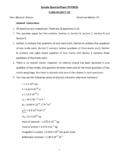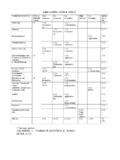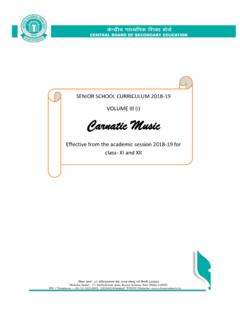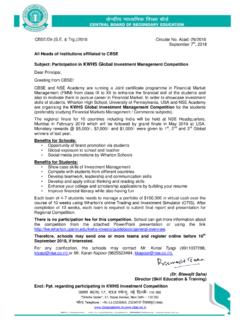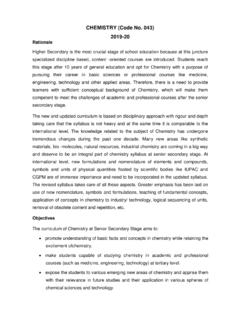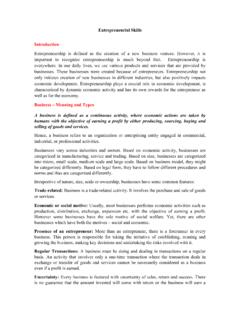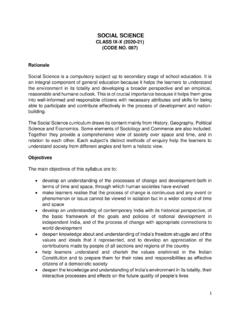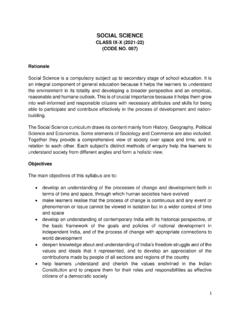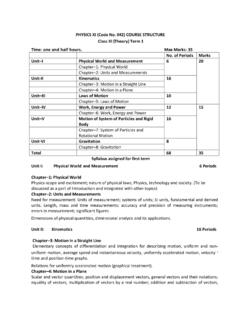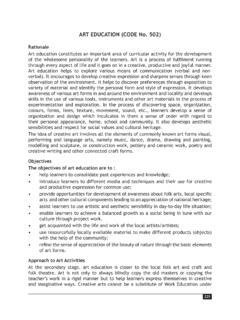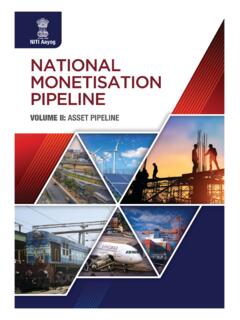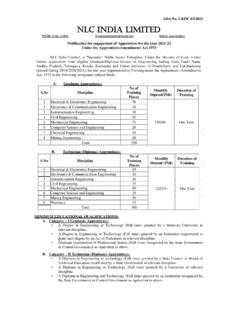Transcription of Geography Code No. 029 Class XI (2021-22) Term wise Syllabus
1 Geography Code No. 029 Class XI (2021-22) Term wise Syllabus COURSE CONTENT TERM I MARKS: 35 Weightage Part A: Fundamentals of Physical Geography 15 Marks Unit I: Geography as a Discipline Geography as an integrating discipline, as a science of spatial attributes. Branches of Geography : Physical Geography and Human Geography . Scope and Career Options (Non-evaluative) 3 Unit II: The Earth Origin and evolution of the earth; interior of the earth Wegener's continental drift theory and plate tectonics Earthquakes and volcanoes: causes, types and effects 9 Unit III: Landforms Rocks: major types of rocks and their characteristics 3 Part B: India - Physical Environment 15 Marks Unit I: Introduction Location, space relations, India's place in the world 7 Unit II: Physiography Drainage systems: Concept of river basins, watershed.
2 The Himalayan and the Peninsular rivers 8 Map work on identification / interpolation of features based on the units on the outline Physical/Political map of the world/ India 5 Part C: Practical Work 15 Marks CH1: Introduction to Maps CH2: Map Scale CH3: Latitudes, Longitudes and Time COURSE CONTENT TERM II MARKS : 35 Weightage Part A: Fundamentals of Physical Geography 15 Marks Unit IV: Climate Atmosphere- composition and structure; elements of weather and climate Insolation-angle of incidence and distribution; heat budget of the earth-heating and cooling of atmosphere (conduction, convection, terrestrial radiation and advection); temperature - factors controlling temperature; distribution of temperature - horizontal and vertical; inversion of temperature Pressure-pressure belts; winds-planetary, seasonal and local; air masses and fronts; tropical and extra-tropical cyclones Precipitation-evaporation; condensation-dew, frost, fog, mist and cloud.
3 Rainfall-types and world distribution 8 Unit V: Water (Oceans) Movements of ocean water-waves, tides and currents; submarine reliefs Ocean resources and pollution 4 Unit VI: Life on the Earth Biosphere - importance of plants and other organisms; biodiversity and conservation. 3 Part B: India - Physical Environment 15 Marks Unit III: Climate, Vegetation and Soil Weather and climate - spatial and temporal distribution of temperature, pressure winds and rainfall, Indian monsoon: mechanism, onset and withdrawal, variability of rainfalls: spatial and temporal; use of weather charts Natural vegetation-forest types and distribution; wild life; conservation.
4 Biosphere reserves Soils - major types (ICAR's classification) and their distribution, soil degradation and conservation 15 Map work on identification/ interpolation of features based on the units on the outline Physical/Political map of the world/ India 5 Part C: Practical Work 15 Marks CH6: Introduction to Aerial Photograph CH7: Introduction to Remote Sensing. CH8: Weather Instruments, Maps and Charts Prescribed Books: 1. Fundamentals of Physical Geography , Class XI, Published by NCERT 2. India, Physical Environment, Class XI, Published by NCERT 3. Practical Work in Geography , Class XI, Published by NCERT Note: The above textbooks are also available in Hindi medium.
5 Geography Code No. 029 Class XII (2021-22) Term wise Syllabus COURSE CONTENT TERM I MARKS : 35 Weightage Part A: Fundamentals of Human Geography 15 Marks Unit I: Human Geography : Nature and Scope 3 Unit II: People Population - distribution, density and growth Population change - spatial patterns and structure; determinants of population change Human development - concept; selected indicators, international comparisons 7 Unit III: Human Activities Primary activities - concept and changing trends; gathering, pastoral, mining, subsistence agriculture, modern agriculture; people engaged in agricultural and allied activities - some examples from selected countries 5 Part B: India: People and Economy 15 Marks Unit I: People Population: distribution, density and growth Migration: International and national-Types causes and consequences 5 Unit II: Human Settlements Rural settlements - types and distribution Urban settlements - types, distribution and functional classification 5 Unit III: Resources and Development Water resources - availability and utilization-irrigation, domestic, 5 industrial and other uses.
6 Scarcity of water and conservation methods-rain water harvesting and watershed management Map Work on identification of features based on 1-5 units on the outline Political map of World. 5 Part C: Practical Work 15 Marks Unit 1: Processing of Data and Thematic Mapping Processing of Data and Thematic Mapping Type and Sources of data: Primary, Secondary and other sources Tabulating and processing of data; calculation of averages, measures of central tendency COURSE CONTENT TERM II MARKS : 35 Weightage Part A: Fundamentals of Human Geography 15 Marks Unit III: Human Activities Secondary activities-concept; manufacturing: types - household, small scale, large scale; agro based and mineral based industries; people engaged in secondary activities - some examples from selected countries Tertiary activities-concept.
7 Trade, transport and tourism; services; people engaged in tertiary activities - some examples from selected countries Quaternary activities-concept; people engaged in quaternary activities - case study from selected countries 9 Unit IV: Transport and Communication Land transport - roads, railways; trans-continental railways Water transport - inland waterways; major ocean routes Air transport - Intercontinental air routes Oil and gas pipelines Satellite communication and cyberspace - importance and usage for geographical information; use of GPS 6 Part B: India: People and Economy 15 Marks Unit III: Resources and Development Mineral and energy resources - distribution of metallic (Iron ore, Copper, Bauxite, Manganese); non-metallic (Mica, Salt) minerals; conventional (Coal, Petroleum, Natural gas and Hydroelectricity) and non-conventional energy sources (solar, wind, biogas) and conservation Planning in India - target group area planning (case study).
8 Idea of sustainable development (case study) 7 Unit IV: Transport and Communication Transport and communication-roads, railways, waterways and airways: oil and gas pipelines; Geographical information and communication networks 4 Unit V: Geographical Perspective on selected issues and problems 4 Environmental pollution; urban-waste disposal Urbanization, rural-urban migration; problems of slums Land degradation Map work on locating and labelling of features based on above units on outline map of India. 5 Part C: Practical Work 15 Marks Unit 1: Processing of Data and Thematic Mapping Representation of data- construction of diagrams: Lines, bars, circles and flowchart; thematic maps; construction of dot; choropleth and isopleth maps Data analysis and generation of diagrams, graphs and other visual diagrams using computers Prescribed Books: 1.
9 Fundamentals of Human Geography , Class XII, Published by NCERT 2. India - People and Economy, Class XII, Published by NCERT 3. Practical Work in Geography , Class XII, Published by NCERT Note: The above textbooks are also available in Hindi medium. Fundamentals of Human Geography Class XII - Textbook I (NCERT) Map Items for identification only on outline political map of the World. Unit-1 Nil Unit-2 Ch. 2 and 4 1 The largest country in each continent in terms of area Unit-3 Ch. 5 to 8 1 Areas of subsistence gathering Primary Activities 2 Major areas of nomadic herding of the world 3 Major areas of commercial livestock rearing 4 Major areas of extensive commercial grain faming 5 Major areas of mixed farming of the World 6 Major areas of Mediterranean agriculture of the World Secondary Activities 1 Ruhr region, Silicon Valley, Appalachian region, Great lakes region Unit - 4 Ch.
10 8 2 Transcontinental Railways: Terminal Stations of transcontinental railways Trans Siberian, Trans Canadian, Tran Australian Railways 3 Major Sea Ports: Europe: North Cape, London, Hamburg North America: Vancouver, San Francisco, New Orleans South America: Rio De Janeiro, Colon, Valparaiso Africa: Suez, Durban and Cape Town Asia: Yokohama, Shanghai, Hong Kong, Aden, Karachi, Kolkata Australia: Perth, Sydney, Melbourne 4. Inland Waterways: Suez Canal, Panama Canal, Rhine waterway and St. Lawrence Seaway 5. Major Airports: Asia: Tokyo, Beijing, Mumbai, Jedda, Aden Africa: Johannesburg & Nairobi Europe: Moscow, London, Paris, Berlin and Rome North America: Chicago, New Orleans, Mexico City South America: Buenos Aires, Santiago Australia: D
